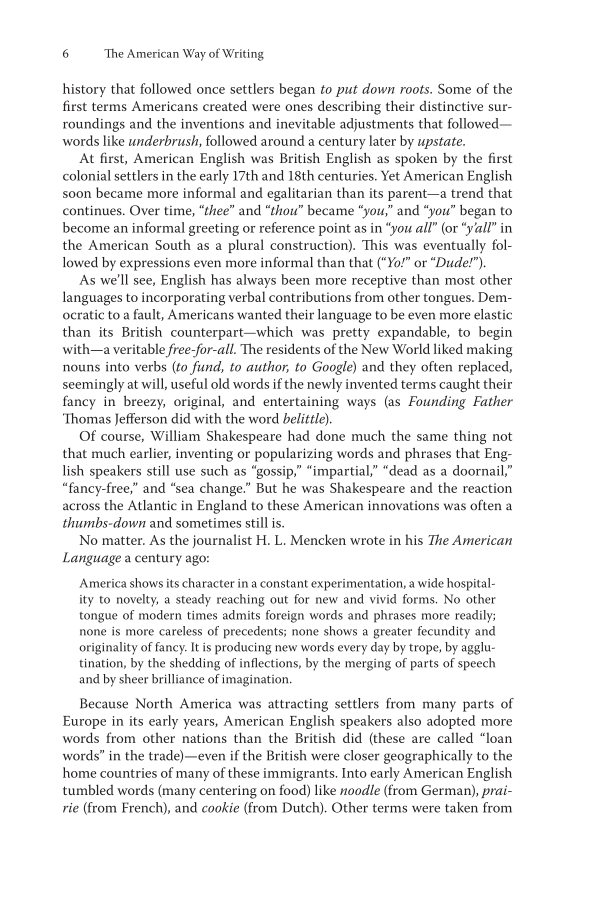6 The American Way of Writing history that followed once settlers began to put down roots. Some of the first terms Americans created were ones describing their distinctive sur- roundings and the inventions and inevitable adjustments that followed— words like underbrush, followed around a century later by upstate. At first, American English was British English as spoken by the first colonial settlers in the early 17th and 18th centuries. Yet American English soon became more informal and egalitarian than its parent—a trend that continues. Over time, “thee” and “thou” became “you,” and “you” began to become an informal greeting or reference point as in “you all” (or “y’all” in the American South as a plural construction). This was eventually fol- lowed by expressions even more informal than that (“Yo!” or “Dude!”). As we’ll see, English has always been more receptive than most other languages to incorporating verbal contributions from other tongues. Dem- ocratic to a fault, Americans wanted their language to be even more elastic than its British counterpart—which was pretty expandable, to begin with—a veritable free-for-all. The residents of the New World liked making nouns into verbs (to fund, to author, to Google) and they often replaced, seemingly at will, useful old words if the newly invented terms caught their fancy in breezy, original, and entertaining ways (as Founding Father Thomas Jefferson did with the word belittle). Of course, William Shakespeare had done much the same thing not that much earlier, inventing or popularizing words and phrases that Eng- lish speakers still use such as “gossip,” “impartial,” “dead as a doornail,” “fancy-free,” and “sea change.” But he was Shakespeare and the reaction across the Atlantic in England to these American innovations was often a thumbs-down and sometimes still is. No matter. As the journalist H. L. Mencken wrote in his The American Language a century ago: America shows its character in a constant experimentation, a wide hospital- ity to novelty, a steady reaching out for new and vivid forms. No other tongue of modern times admits foreign words and phrases more readily none is more careless of precedents none shows a greater fecundity and originality of fancy. It is producing new words every day by trope, by agglu- tination, by the shedding of inflections, by the merging of parts of speech and by sheer brilliance of imagination. Because North America was attracting settlers from many parts of Europe in its early years, American English speakers also adopted more words from other nations than the British did (these are called “loan words” in the trade)—even if the British were closer geographically to the home countries of many of these immigrants. Into early American English tumbled words (many centering on food) like noodle (from German), prai- rie (from French), and cookie (from Dutch). Other terms were taken from
Document Details My Account Print multiple pages
Print
You have printed 0 times in the last 24 hours.
Your print count will reset on at .
You may print 0 more time(s) before then.
You may print a maximum of 0 pages at a time.














































































































































































































































